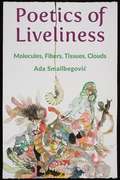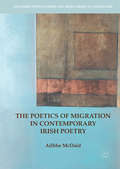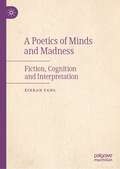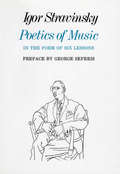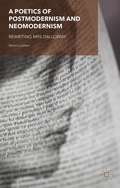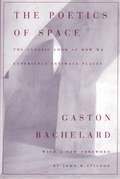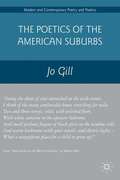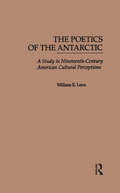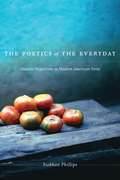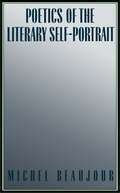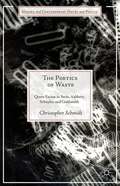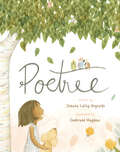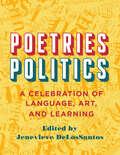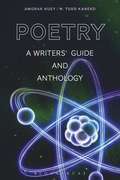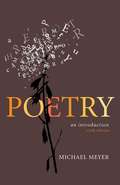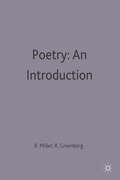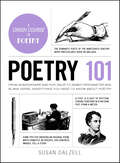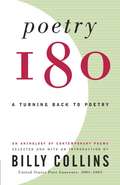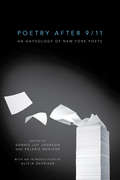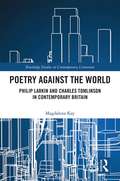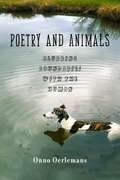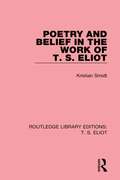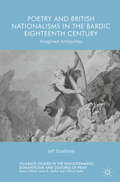- Table View
- List View
Poetics of Liveliness: Molecules, Fibers, Tissues, Clouds
by Ada SmailbegovićCan poetry act as an aesthetic amplification device, akin to a microscope, through which we can sense minute or nearly imperceptible phenomena such as the folding of molecules into their three-dimensional shapes, the transformations that make up the life cycle of a silkworm, or the vaporous movements that constitute the ever-shifting edges of clouds? We tend to think of these subjects as reserved for science, but, as Ada Smailbegović argues, twentieth- and twenty-first-century writers have intermingled scientific methodologies with poetic form to reveal unfolding processes of change. Their works can be envisioned as laboratories within which the methodologies of experimentation, natural historical description, and taxonomic classification allow poetic language to register the rhythms and durations of material transformation.Poetics of Liveliness moves across scales to explore the realms of molecules, fibers, tissues, and clouds. It investigates works such as Christian Bök’s insertion of a poetic text into the DNA code of living bacteria in order to generate a new poem in the shape of a protein molecule, Jen Bervin’s considerations of silk fibers and their use in biomedicine, Gertrude Stein’s examination of brain tissues in medical school and its subsequent influence on her literary taxonomies of character, and Lisa Robertson’s studies of nineteenth-century meteorology and the soft architecture of clouds. In their attempt to understand physical processes unfolding within lively material worlds, Smailbegović contends, these poets have developed a distinctive materialist poetics. Structured as a poetic cosmology akin to Lucretius’s “On the Nature of Things,” which begins at the atomic level and expands out to the vastness of the universe, Poetics of Liveliness provides an innovative and surprising vision of the relationship between science and poetry.
The Poetics of Migration in Contemporary Irish Poetry
by Ailbhe McDaidThis book offers fresh critical interpretation of two of the central tenets of Irish culture - migration and memory. From its starting point with the 'New Irish' generation of poets in the United States during the 1980s and concluding with the technological innovations of 21st-century poetry, this study spans continents, generations, genders and sexualities to reconsider the role of memory and of migration in the work of a range of contemporary Irish poets. Combining sensitive close readings and textual analysis with thorough theoretical application, it sets out the formal, thematic, socio-cultural and literary contexts of migration as an essential aspect of Irish literature. This book is essential reading for literary critics, academics, cultural commentators and students with an interest in contemporary poetry, Irish studies, diaspora studies and memory studies.
A Poetics of Minds and Madness: Fiction, Cognition and Interpretation
by XINRAN YANGThis monograph aims to explore the mind-narrative nexus by conducting a cognitive narratological study on the mad minds in fictional narratives. Set on the interface of narrative and cognitive science (cognitive linguistics, cognitive psychology and cognitive neuropsychology), it adopts an indirect empirical approach to the fictional representation of madness. The American writer Ken Kesey’s novel One Flew Over the Cuckoo’s Nest is chosen as the primary text of investigation, whereas due consideration is also given to other madness narratives when necessary. This book not only demonstrates the value of reading and rereading literary classics in the modern era, but also sheds light on the studies of cognitive narratology, cognitive poetics, madness narratives and literature in general.
Poetics of Music
by Igor Stravinsky Arthur Knodel Ingolf DahlThese lessons provide penetrating glimpses into the thought processes of Stravinsky's mind. While dealing with his chosen topics-the phenomenon of music, the composition of music, musical typology, the avatars of Russian music, and the performance of music-he reveals his reverence for tradition, order and discipline. He believes 'the more art is controlled, limited, worked over, the more it is free. His opinions about Wagner, Verdi, Berlioz, Hindemith, Weber, Beethoven, Glinka, Tchaikovsky, Moussorgsky and Bach are refreshing. He also analyzes the function of the critic, the requirements of the interpreter, the state of Russian music, and musical taste and snobbery." - The American Recorder Once again the concertgoer and music lover can take pleasure in Igor Stravinsky's thoughts on the essentials of music. It was over thirty years ago that Stravinsky delivered the Charles Eliot Norton Lectures at Harvard University on which the French-language edition of this book and later the English translation by Arthur Knodel and Ingolf Dahl were based. Now his Poetics of Music is available in paper-with a preface by George Seferis.
A Poetics of Postmodernism and Neomodernism
by Monica LathamVirginia Woolf's Mrs Dalloway, one of the most significant modernist texts from the Western literary canon, has spawned numerous contemporary offspring. Contemporary authors have dialogued with it, challenged it, reinvented it and offered creative responses to it, thus reinforcing its accumulated critical reputation and canonical status. After meticulously tracing the genesis of Woolf's most iconic novel so as to examine the production of Woolf's idiosyncratic Dalloway-esque signature, A Poetics of Postmodernism and Neomodernism sets out to explore its reproduction by a variety of postmodernist and neomodernist Anglo-American writers who are either openly indebted to Woolf's novel or covertly influenced by it. The contemporary tributes that are indebted to Mrs Dalloway in so many ways have rejuvenated the Woolfian novel and have propelled it into the twenty-first century. Almost a hundred years after its publication, Woolf's Mrs Dalloway has proved to be an enduring text, an 'ice-breaking vessel' which continues to invite 'individual talents' to follow in its wake.
The Poetics of Space
by Gaston Bachelard John R. StilgoeThirty years since its first publication in English, French philosopher Gaston Bachelard's The Poetics of Space one of the most appealing and lyrical explorations of home. Bachelard takes us on a journey, from cellar to attic, to show how our perceptions of houses and other shelters shape our thoughts, memories, and dreams.
The Poetics of the American Suburbs
by Jo GillThe first scholarly study of the rich body of poetry that emerged from the post-war American suburbs, Gill evaluates the work of forty poets, including Anne Sexton, Langston Hughes, and John Updike. Combining textual analysis and archival research, this book offers a new perspective on the field of twentieth-century American literature.
The Poetics of the Antarctic: A Study in Nineteenth-Century American Cultural Perceptions (Studies In Nineteenth-century American Literature #Vol. 5)
by William E. LenzThe thesis of this book is that the 19th-century interest in the Antarctic functions for modern scholars as an important index to American self-discovery and self-definition from the 1830s onward. According to the author, American hopes for confirming identity came to be focused on an unlikely goal, the discovery of the illusive Antarctic continent. By examining in detail one literary product of the U.S. Exploring Expedition (1838-1842) to Antarctica, James Croxall Palmer's epic poem Thulia: A Tale of the Antarctic (1843), and its revision, The Antarctic Mariner's Song (1868), and by locating these works within their cultural context, Lenz reveals the significance and changing meaning of exploration to emerging American concepts of nationhood. The volume also considers the tradition of American sea fiction in the works of such writers as James Fenimore Cooper, Edgar Allan Poe, and Herman Melville, arguing that for these writers the Antarctic was a locus of symbolic meaning while for Palmer it was a process of individual and collective perception. The 1868 version of the Palmer poem is attached here as an appendix. A useful bibliography follows that appendix.
The Poetics of the Everyday: Creative Repetition in Modern American Verse
by Siobhan PhillipsWallace Stevens once described the "malady of the quotidian," lamenting the dull weight of everyday regimen. Yet he would later hail "that which is always beginning, over and over"-recognizing, if not celebrating, the possibility of fresh invention. Focusing on the poems of Wallace Stevens, Robert Frost, Elizabeth Bishop, and James Merrill, Siobhan Phillips positions everyday time as a vital category in modernist aesthetics, American literature, and poetic theory. She eloquently reveals how, through particular but related means, each of these poets converts the necessity of quotidian experience into an aesthetic and experiential opportunity. In Stevens, Phillips analyzes the implications of cyclic dualism. In Frost, she explains the theoretical depth of a habitual "middle way." In Bishop's work, she identifies the attempt to turn recurrent mornings into a "ceremony" rather than a sentence, and in Merrill, she shows how cosmic theories rely on daily habits. Phillips ultimately demonstrates that a poetics of everyday time contributes not only to a richer understanding of these four writers but also to descriptions of their era, estimations of their genre, and ongoing reconfigurations of the issues that literature reflects and illuminates.
Poetics of the Literary Self-Portrait
by Michel BeaujourA serious and independent contribution to the literature of autobiography.-- John SturrockFrench StudiesClearly a landmark study. It seems certain to provoke a great deal of productive debate among those concerned with any of the many issues it raises.-- Comparative Literature The literary self-portrait, often considered to be an ill- formed autobiography, is receiving more attention as a result of the current obsession with personal narrative, but little progress has been made toward an understanding of its specific features. With Poetics of the Literary Self-Portrait, Michel Beaujour reveals the hidden ambitions of this genre. From St. Augustine to Montaigne, from Nietzsche to Malraux, Leiris and Barthes, individual self-portraits are analyzed jointly with the enduring cultural matrix from which self-portrayal derives its disconcerting non-narrative structure, and many of its recurrent topics.
The Poetics of Trespass
by Erik AndersonUsing his Denver apartment as a central locale, Erik Anderson walked a path that traced the letters Pastoral between February and March 2007. Navigating the various curves and corners of the city streets, Anderson charts the experiences of a writer in a man-made environment. Explorative, adventurous, and insightful, Anderson's meditations serve as a compelling social and aesthetic commentary.
The Poetics of Waste
by Christopher SchmidtModernist debates about waste - both aesthetic and economic - often express biases against gender and sexual errancy. The Poetics of Waste looks at writers and artists who resist this ideology and respond by developing an excessive poetics.
Poetree
by Shauna LaVoy ReynoldsA girl writes a poem to a tree, but then is surprised when the tree writes back in this wondrous and warm picture book about friendship, nature, and the power of poetry.The snow has melted, the buttercups are blooming, and Sylvia celebrates winter's end by writing a poem. She ties her poem to a birch tree, hoping that it doesn't count as littering if it makes the world more beautiful. But when she returns, a new poem is waiting for her. Could the tree really be writing back? Sylvia decides to test her theory, and so begins a heartwarming poetic correspondence...as well as an unexpected new friendship. Lyrical and sweetly satisfying, Poetree is about finding beauty in the world around you, and new friends in unlikely places.
Poetries - Politics: A Celebration of Language, Art, and Learning
by Mary Shaw Francois Cornilliat Atif Atkin Ouafaa Deleger Ian Lovoulos Devon Monaghan Jenevieve DeLosSantosPoetries – Politics: A Celebration of Language, Art, and Learning celebrates the best of innovative humanities pedagogy and creative graphic design. Designed and implemented during a time of political divisiveness, the Poetries – Politics project created a space of inviting, multilingual walls on the Rutgers campus, celebrating diversity, community, and cross-cultural exchange. This book, like the original project, provides a platform for the incredible generative power of student-led work. Essays feature the perspectives of three students and professors originally involved in the project, reflecting on their learning and exploring the works they selected for the original exhibition. The essays lead to a beautifully illustrated catalogue of the original student designs. Reproduced in full color and with the accompanying poems in both their original language and a translation, this catalogue commemorates the incredible creative spirit of the project and provides a new way of contemplating these great poetic works.
Poetry: A Writers' guide and Anthology
by W. Todd Kaneko Amorak HueyThe authors map out more than 25 key elements of poetry including image, lyric, point of view, metaphor, and movement and use these elements as starting points for discussion questions and writing prompts. The book guides the reader through a range of poetic modes including: Elegy, Found poems, Nocturne, Ode, Protest poems, Ars Poetica, Lyric, Narrative Poetry also offers inspiring examples of contemporary poetry covering all the modes and elements discussed by the book.
Poetry: An Introduction (6th Edition)
by Michael MeyerFlexible enough for any poetry course, this text is designed to make your students lifelong lovers of poetry. It combines classic poetry with today's hippest verse, mixing in delicious portions of contemporary life, humor, and universal themes. In-depth chapters on authors such as Emily Dickinson and Billy Collins reveal the real-life contexts in which poets create. There is also plenty of support for students -- with thorough chapters on the poetic elements, six sensible chapters on critical reading and writing, and many helpful sample close readings, writing assignments, and student papers.
Poetry
by Ruth Miller Robert A. GreenbergThis book provides an introduction to the elements of poetry, formulates a series of contexts for the interpretation of poems, and offers a substantial anthology. Its purpose is to enable students to read poems with understanding and pleasure and to provide them with a basic vocabulary for analysing and talking about poems.
Poetry 101: From Shakespeare and Rupi Kaur to Iambic Pentameter and Blank Verse, Everything You Need to Know about Poetry (Adams 101)
by Susan DalzellBecome a poet and write poetry with ease with help from this clear and simple guide in the popular 101 series. Poetry never goes out of style. An ancient writing form found in civilizations across the world, poetry continues to inform the way we write now, whether we realize it or not—especially in social media—with its focus on brevity and creating the greatest possible impact with the fewest words. Poetry 101 is your companion to the wonderful world of meter and rhyme, and walks you through the basics of poetry. From Shakespeare and Chaucer, to Maya Angelou and Rupi Kaur, you&’ll explore the different styles and methods of writing, famous poets, and poetry movements and concepts—and even find inspiration for creating poems of your own. Whether you are looking to better understand the poems you read, or you want to tap into your creative side to write your own, Poetry 101 gives you everything you need!
Poetry 180: A Turning Back to Poetry
by Billy CollinsThis book is a dazzling new anthology of 180 contemporary poems, selected and introduced by America's Poet Laureate, Billy Collins.
Poetry After 9/11: An Anthology of New York Poets
by Valerie Merians Dennis Loy JohnsonThe 10th anniversary edition of this important and inspiring collection is a sweeping overview of poetry written in New York in the year after the 9/11 attacks. This 10th anniversary edition of the popular anthology contains poems by forty-five of the most important poets of the day, as well as some of the literary world's most dynamic young voices, all writing in New York City in the year immediately following the World Trade Center attacks.After 9/11 poetry was everywhere--on telephone poles, on warehouse walls, in the bus shelters. People spontaneously turned to poetry to understand and cope with the tragedy of the attack. Full of humor, love, rage and fear, this diverse collection of poems attests to the power of poetry to express and to heal the human spirit. Featuring poems by Pulitzer Prize winner Stephen Dunn; Best American Poetry series editor David Lehman; National Book Award winner and New York State Poet Jean Valentine; the first ever Nuyorican Slam-Poetry champ; poets laureate of Brooklyn and Queens; and a poem and introduction by National Book Award finalist Alicia Ostriker.From the Trade Paperback edition.
Poetry after the Invention of América: Don’t Light the Flower (Modern and Contemporary Poetry and Poetics)
by Andrés AjensThese essays trace the Western poem as it confronts indigenous alterity in Latin America. Andrés Ajens approaches literature as a Western invention and seeks connections between the two traditions. This book discusses a wide range of indigenous American, Hispanic, and European texts, with a focus on language, authorship, genre, and translation.
Poetry Against the World: Philip Larkin and Charles Tomlinson in Contemporary Britain (Routledge Studies In Contemporary Literature Ser.)
by Magdalena KayPoetry Against the World: Philip Larkin and Charles Tomlinson in Contemporary Britain brings together two major poets, who espouse opposite aesthetic ambitions, yet are both taken as paragons of Englishness, in order to ask how they pitch their poetry against an inhospitable world. This book explores how these two representative poets seek to redress an "age of demolition" through their poetry, and how their audiences react to the types of redress they propose.
Poetry and Animals: Blurring the Boundaries with the Human
by Onno OerlemansWhy do poets write about animals? What can poetry do for animals and what can animals do for poetry? In some cases, poetry inscribes meaning on animals, turning them into symbols or caricatures and bringing them into the confines of human culture. It also reveals and revels in the complexity of animals. Poetry, through its great variety and its inherently experimental nature, has embraced the multifaceted nature of animals to cross, blur, and reimagine the boundaries between human and animal.In Poetry and Animals, Onno Oerlemans explores a broad range of English-language poetry about animals from the Middle Ages to the contemporary world. He presents a taxonomy of kinds of animal poems, breaking down the categories and binary oppositions at the root of human thinking about animals. The book considers several different types of poetry: allegorical poems, poems about “the animal” broadly conceived, poems about species of animal, poems about individual animals or the animal as individual, and poems about hybrids and hybridity. Through careful readings of dozens of poems that reveal generous and often sympathetic approaches to recognizing and valuing animals’ difference and similarity, Oerlemans demonstrates how the forms and modes of poetry can sensitize us to the moral standing of animals and give us new ways to think through the problems of the human-animal divide.
Poetry and Belief in the Work of T. S. Eliot (Routledge Library Editions: T. S. Eliot #7)
by Kristian SmidtThis title, first published in 1961, explores the general background of attitudes, beliefs and ideas from which Eliot’s works have originated. This study examines the influences of Eliot’s work, and includes Eliot’s personal views as told to the author. The book also looks at technique, structure and imagery of his poetry. This title will be of interest to students of literature.
Poetry and British Nationalisms in the Bardic Eighteenth Century: Imagined Antiquities (Palgrave Studies In The Enlightenment, Romanticism And Cultures Of Print Ser.)
by Jeff StraboneThis book offers a radical new theory of the role of poetry in the rise of cultural nationalism. With equal attention to England, Scotland, and Wales, the book takes an Archipelagic approach to the study of poetics, print media, and medievalism in the rise of British Romanticism. It tells the story of how poets and antiquarian editors in the British nations rediscovered forgotten archaic poetic texts and repurposed them as the foundation of a new concept of the nation, now imagined as a primarily cultural formation. It also draws on legal and ecclesiastical history in drawing a sharp contrast between early modern and Romantic antiquarianisms. Equally a work of literary criticism and history, the book offers provocative new theorizations of nationalism and Romanticism and new readings of major British poets, including Allan Ramsay, Thomas Gray, and Samuel Taylor Coleridge.
